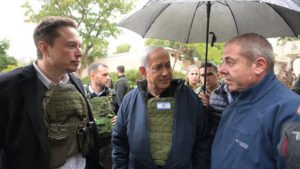In an unexpected turn of events, Elon Musk, the visionary entrepreneur behind SpaceX and Tesla, has found himself at the center of the Israel-Hamas conflict. Musk’s foray into the complex geopolitical landscape began with a visit to Tel Aviv, where he toured the site of a recent Hamas assault. What transpired during his visit, however, took an even more surprising twist.
Musk, who now owns the social media platform X, formerly known as Twitter, declared his support for Israel, emphasizing the need to “deradicalize” the Palestinian territories. This stance immediately drew the attention of Hamas, the Palestinian militant group in control of the Gaza Strip. In response, a senior Hamas official extended an invitation to Musk, urging him to witness firsthand the devastation caused by Israeli bombardment in Gaza.
Hamas Invitation to Musk
Osama Hamdan, a prominent figure within Hamas, addressed the  media in Beirut, extending the invitation to Musk and emphasizing the importance of objectivity and credibility in assessing the situation. The invitation puts Musk in a unique position, potentially bridging the gap between the technology-driven future he envisions and the longstanding conflicts in the Middle East.
media in Beirut, extending the invitation to Musk and emphasizing the importance of objectivity and credibility in assessing the situation. The invitation puts Musk in a unique position, potentially bridging the gap between the technology-driven future he envisions and the longstanding conflicts in the Middle East.
How it all Started
Musk’s visit to Tel Aviv included a tour of the Kfar Aza kibbutz, the site of a recent Hamas assault on Israel. During this visit, he pledged to do “whatever was necessary to stop the spread of hatred.” This commitment led to a meeting with Israeli Prime Minister Benjamin Netanyahu, where Musk expressed his support for Israel’s

perspective on the conflict.
Netanyahu, firm in his stance against Hamas, declared that the militant group must be destroyed. Musk’s response was succinct: “There’s no choice.” This alignment with the Israeli perspective indicates Musk’s willingness to engage in the complexities of the region’s conflicts, going beyond the realm of technology and business.
Musk’s Involvement
Musk’s unexpected involvement took a humanitarian turn as he expressed his desire to contribute to the reconstruction of Gaza after the war. His condition, though, was clear – the need to first “deradicalize” the Palestinian territories. This stance showcases Musk’s belief in addressing the root causes of conflict before engaging in the process of rebuilding.
During his visit, Musk received a symbolic gesture from Malki Shem-Tov, the father of an Israeli hostage held by Hamas in Gaza. The metal dog tag, inscribed with the words “Our hearts are hostage in Gaza,” became a powerful emblem of the human toll of the conflict. Musk pledged to wear the tag around his neck until all hostages were set free, adding a personal dimension to his engagement with the region’s challenges.
Casualties During Israel-Hamas War
As the Israel-Hamas conflict entered its eighth week, the toll on both sides became increasingly evident. The health ministry in Gaza reported over 16,000 casualties, including thousands of children, while Israel faced the ongoing threat of Hamas attacks. Amid this grim reality, a four-day truce deal emerged, offering a brief respite from the violence. The deal, extended by two days, outlined the release of hostages held by Hamas in exchange for Palestinian security prisoners.
sides became increasingly evident. The health ministry in Gaza reported over 16,000 casualties, including thousands of children, while Israel faced the ongoing threat of Hamas attacks. Amid this grim reality, a four-day truce deal emerged, offering a brief respite from the violence. The deal, extended by two days, outlined the release of hostages held by Hamas in exchange for Palestinian security prisoners.
Role of Musk For Hamas
Musk’s unexpected role in this conflict highlights the evolving nature of his influence beyond the tech industry. His commitment to addressing the underlying issues of radicalization and his willingness to engage with conflicting parties make him a unique player in the pursuit of peace in the Middle East.
Elon Musk’s journey from tech titan to Middle East peacemaker adds a fascinating chapter to his already storied career. As he navigates the complexities of the Israel-Hamas conflict, Musk’s actions and statements underscore the potential for individuals from diverse fields to contribute to resolving entrenched geopolitical issues. Only time will tell how Musk’s involvement shapes the path towards peace in this troubled region.










